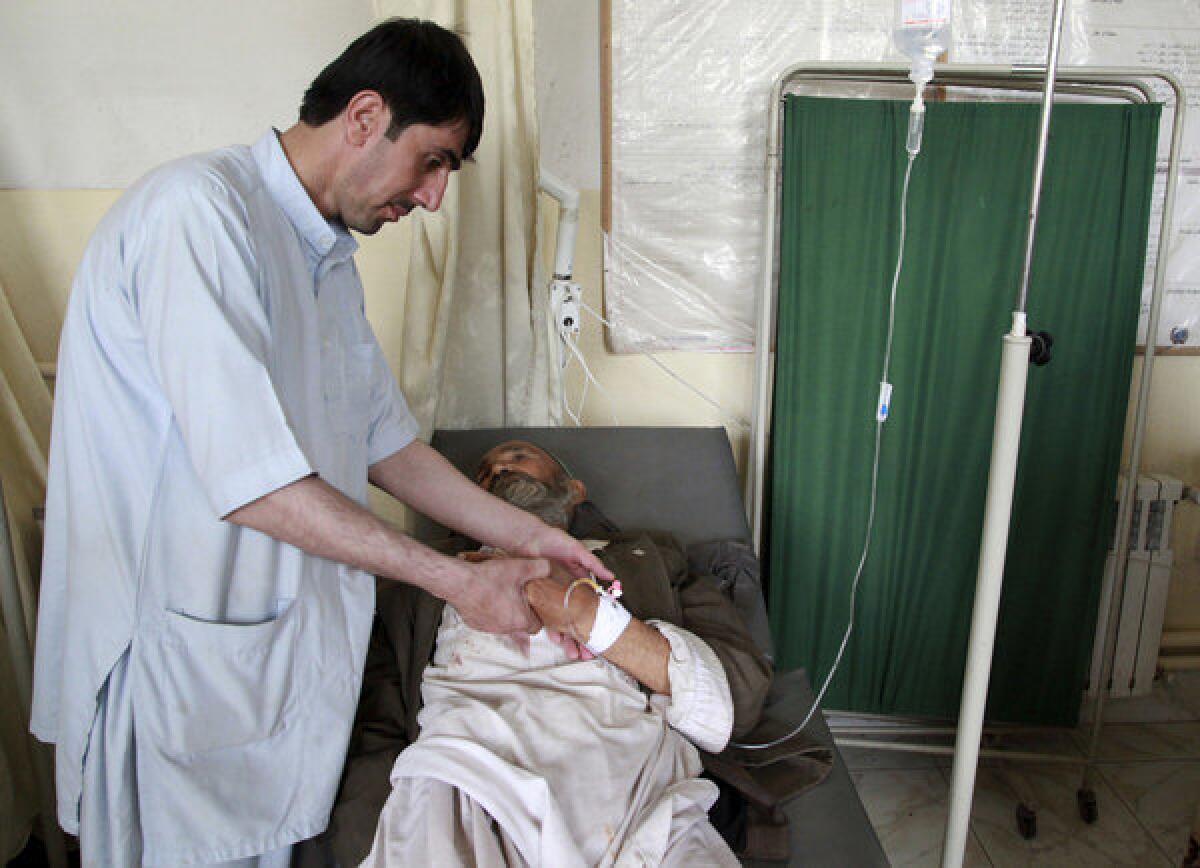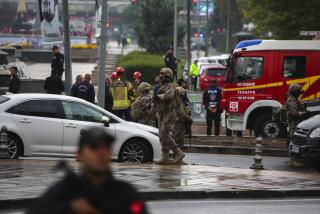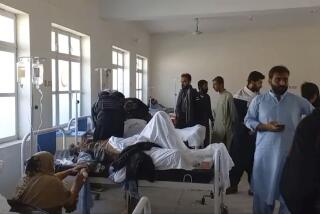Afghanistan district governor killed in suicide attack at mosque

- Share via
KABUL, Afghanistan -- A suicide bomber slipped into a crowd of mourners at a funeral in northern Afghanistan on Friday morning, waited until the district governor and two of his bodyguards were leaving the mosque, and detonated his vest, killing eight people and wounding 16, officials said.
The attack, the latest incident in a particularly bloody week, succeeded in killing Sheikh Sadruddin Saadi, the governor of the Dasht-e-Archi district of Kunduz province and the apparent target, said Mohammad Khalil Andarabi, the provincial police chief. The funeral was in honor of a local man who died of natural causes, Andarabi added.
No one claimed immediate responsibility for the attack, which took place around 8 a.m., but analysts said they suspected the Taliban. Saadi, a high-profile mujahedeen leader in northern Kunduz province during the Soviet occupation, is a member of the anti-Taliban Jamiat-e-Islami party.
Afghan and North Atlantic Treaty Organization officials had warned that the Taliban and other militants could step up attacks after the Muslim holy month of Ramadan, as they try and exploit the remaining months of Afghanistan’s “fighting season,” which generally lasts from March to October, when Afghanistan’s brutal winter sets in.
This week’s stepped-up violence is part of a Taliban muscle-flexing exercise, analysts said, as power shifts, the militant group’s hand strengthens, and a political agreement, however elusive, becomes more likely.
“The Taliban has increased its attacks, especially in the past week, to show a strong hand in hopes of securing more benefits from any talks,” said Abdul Wahid Taqat, a Kabul-based military analyst. “And they’re keen to disrupt [President Hamid] Karzai’s trip to Pakistan.”
On the military front, the Taliban sees its position improving as foreign combat troops pull back in advance of their late-2014 scheduled withdrawal -- there are currently around 100,000 NATO troops in the country, of which 60% are Americans -- leaving weaker Afghan forces responsible for more of the nation’s security. Local security forces, numbering around 350,000, are battling poor morale, training, equipment and high desertion rates, they added, leaving the Taliban confident it can defeat them after the foreigners leave.
On the political front, the militant group also senses opportunities it can exploit, analysts added.
Karzai’s last term ends with the April general election, increasingly making him a lame duck. The United States is keen to negotiate a political solution with the Taliban as its military clout wanes, leaving the militants in no hurry to strike a deal, confident that time is on their side, analysts said. And the Taliban watched Karzai return this week from Pakistan empty-handed after he’d called on Islamabad to crack down on its side of their shared border, where many Taliban fighters take refuge.
The large number of Taliban attacks this week have left dozens of Afghan civilians and security officials dead, along with three NATO troops.
A NATO soldier died Monday in southern Afghanistan after a roadside bomb detonated. On Tuesday, six men who’d been kidnapped while working on a United Nations development project were killed when negotiations broke down for their release in western Herat province, among Afghanistan’s more stable areas.
On Wednesday, a NATO soldier was killed in western Afghanistan, the same day four civilians were killed in southern Helmand province and several Afghan security forces were killed in eastern Ghazni province during a Taliban attack on a NATO military base. And on Thursday, 15 policemen were killed in an ambush in western Farah province. For the week, at least 30 civilians were killed by militants.
The week’s stepped-up attacks were almost certainly coordinated by senior Taliban commanders, not the result of a confluence of local operations, Taqat said, probably with the knowledge and support of parts of the Pakistani military keen to destabilize Afghanistan and increase Islamabad’s influence after 2014, he added. Pakistan has strongly and repeatedly denied any support for Afghan militancy.
While local Taliban cells have the resources and authority to carry out roadside bombings, they aren’t able to pull off more sophisticated, coordinated strikes at NATO bases and Afghan government buildings as seen this week, Taqat said.
“So all those organized attacks are being plotted by their leadership,” he said, “in consultation with the Pakistani spy agencies.”
ALSO:
White House officials brief congressional leaders on Syria
U.N. chemical weapons inspectors to leave Syria by Saturday
North Korea’s Kim reportedly has ex-girlfriend, 11 others executed
Twitter: @markmagnier
Special correspondent Hashmat Baktash in Kabul contributed to this report.
More to Read
Sign up for Essential California
The most important California stories and recommendations in your inbox every morning.
You may occasionally receive promotional content from the Los Angeles Times.










